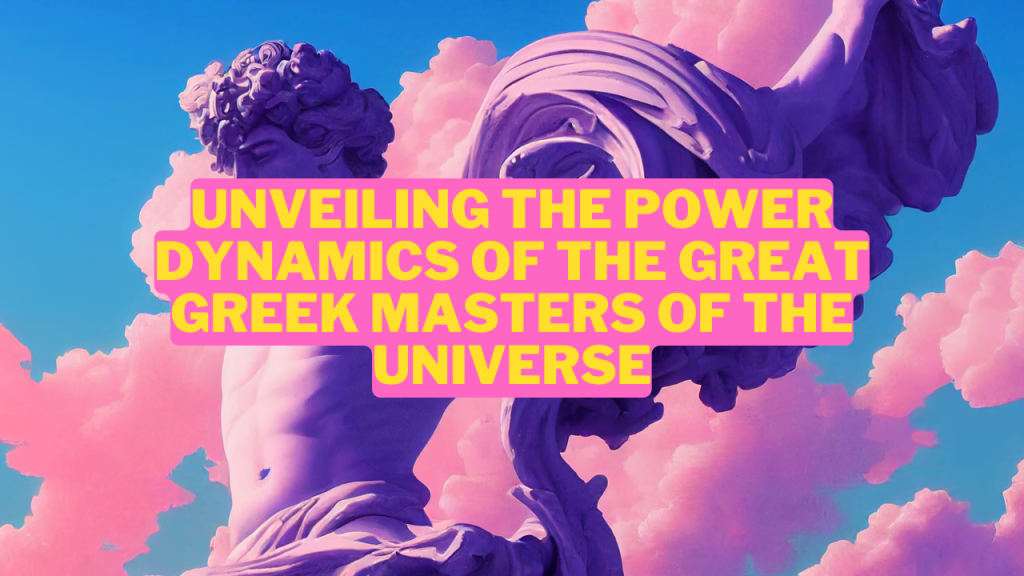Unveiling the Power Dynamics of the Great Greek Masters of the Universe
All about the Greek GOD

Introduction:
The intricate power dynamics within Greek mythology have long captivated scholars and enthusiasts alike. The hierarchy and abilities of the gods have been a subject of debate, prompting questions such as: Can the god of the Underworld triumph over the deity capable of shaking the Earth to its core? Would the God of War stand a chance against the Goddess of War? In this exploration, we will delve into the fascinating world of the Greek pantheon and shed light on the powers and significance of these legendary deities.
Morpheus, the God of Dreams:
Amidst the discussions of power, it is important to note that not all Greek gods engaged in epic battles. Take, for instance, Morpheus, the God of Dreams. While his powers may not involve physical might, his ability to enter and control dreams holds a unique form of influence. Hypnos, his father and the God of Sleep, also possessed considerable power by lulling Zeus into slumber on multiple occasions. Hynos' role in manipulating the outcome of the Trojan War further solidifies his status. However, Morpheus, as his son, played a crucial role as a messenger, relaying divine messages to mortals through their dreams—an ability showcased in the film Inception. Despite his subtler power, Morpheus played an important role and is revered as a benevolent god.
Tartarus, the God of the Abyss:
Venturing into the underworld, we encounter Tartarus, both a god and a place of darkness. Tartarus represents one of the earliest depictions of a hellish realm, reserved for the punishment of wicked individuals and titans. Known in ancient Hebrew texts as the place where fallen angels were banished, Tartarus occupies a deep chasm below Hades. Typhon, the fearsome winged serpent and son of Tartarus, epitomizes the destructive nature of this lineage. Though not the most powerful, Tartarus' association with such terrifying creatures solidifies his position as a significant deity within Greek mythology.
Hephaestus, the God of the Forge:
Surprisingly, it is Hephaestus, the god of the forge and blacksmithing, who claims the next spot on our list. While one might initially question his placement above Tartarus, Hephaestus possesses extraordinary powers. As the son of Zeus, he played a pivotal role in crafting the gods' weapons, essentially acting as the arsenal of the divine pantheon. Additionally, Hephaestus is credited with creating Pandora, the first human woman, and forging her infamous box. Despite his tumultuous relationships with his family, including a troubled alliance with Aphrodite, Hephaestus's role as a skilled creator and his extensive contributions to the gods' arsenal solidify his significance.
Atlas, the Indomitable Titan:
In the era before the classical Greek gods, the titans held sway. Among them, Atlas stood out as a titan of immense strength. Although not the most powerful titan, his exceptional physical might earns him a place on this list. As the brother of Prometheus, who bestowed fire upon humanity, Atlas bears the weight of the celestial spheres on his back as a perpetual punishment. This superhuman feat showcases his incredible strength and enduring endurance.
Hermes, the Herald of the Gods:
Hermes, the multifaceted messenger of the gods, is a deity of remarkable versatility and influence. Known as the god of nature, travelers, merchants, and more, Hermes embodied the interconnectedness of various realms. His ability to traverse between the Underworld, Olympus, Hades, and Atlantis made him an invaluable messenger. Hermes's trickery and manipulation on Earth mirrored the power of contemporary media, emphasizing the influence of information dissemination in shaping events. Moreover, his complex relationships, such as his love affair with Aphrodite, reveal the intricate dynamics of the gods.
Artemis, the Goddess of the Hunt:
Artemis, daughter of Zeus and twin sister of Apollo, assumed multiple roles within Greek mythology. As the goddess of hunting, nature, chastity, and protector of women in childbirth, Artemis held great significance in the lives of mortals. Her early requests to Zeus exemplify her power and privilege, demonstrating her desire for eternal virginity and vast domains over rivers, mountains, and cities. The magnitude of her influence is further evident in the construction of a monumental temple dedicated to her, solidifying her place among the Seven Wonders of the Ancient World.
Nike, the Goddess of Victory:
Long before "Air Jordan" became synonymous with victory, Nike reigned as an influential goddess. During the Titanomachy, the ten-year battle between the gods and titans, Nike sided with Zeus, earning a prominent position beside him. Revered as the goddess of speed, strength, and victory, Nike's support was highly sought after. Her exact powers remain ambiguous, but her allegiance to the victors and her role in motivating and ensuring triumph in both divine and mortal endeavors cement her status as a powerful deity.
Demeter, the Goddess of Agriculture:
Demeter, daughter of Chronos, the ruler of the Golden Age, exemplifies the significant role she played in sustaining life through her dominion over grain and agriculture. Often associated with bountiful harvests and the fertility of the land, Demeter's importance to humanity cannot be overstated. The mythical tale of her daughter
About the Creator
Mahamud Hayet Arpon
I am a versatile and talented writer with a passion for storytelling. Born with a vivid imagination and a love for words, I embarked on a literary journey that has shaped their identity as a writer.






Comments
There are no comments for this story
Be the first to respond and start the conversation.